| The Ruger Single-Nine (bottom) is a nine-shot single-action 22 WMR revolver that is modeled after the Ruger Single-Six (top). The Single-Nine cylinder (right) and the Single-Six cylinder (left) are the same dimensions despite the different capacity. These cylinders will fit in either frame, but you can not cock the hammer with the wrong cylinder in the wrong gun. The front sight is a well-protected fiber optic unit. Ruger took the extra effort of fashioning the element housing so that it creates a crisp square post profile for precise aiming. The rear sight also has a fiber optic element. It is also click-adjustable for windage and elevation and has a small micrometer scale for recording adjustments. The Single-Nine is equipped with a transfer bar safety (arrow) that prevents the gun from firing accidently if it is dropped on its hammer. The Single-Nine comes shipped with a plastic tab that locks the cylinder and thus the hammer. It needs to be removed by removing the cylinder before cleaning then shooting the gun. The first step to removing the cylinder is to open the gate and confirm the gun is unloaded. Keep the gate open. Depending on where you live, your Single-Nine may come equipped with an internal keyed lock. The Ruger owner’s manual has instruction on how to modify the grip so you don’t have to remove the grip to use the lock. The rear sight also has a fiber optic element. It is also click-adjustable for windage and elevation and has a small micrometer scale for recording adjustments. They cylinders are carefully fitted to their respective frames and marked with the serial number to prevent any mismatch. Six of the nine chambers fired tight groups. The sample gun had a minor timing issue with the other three chambers, which may have caused the two consistently low hits. |
by Scott Mayer
When it comes to handguns, I’ve encountered some folks who have all but declared revolvers extinct. They’re wrong, but their attitude is completely understandable considering the many autopistol introductions there have been in the past few years for defense or concealed carry and all the hype that always surrounds them. But there’s more to the handgun market than protecting yourself, and revolvers aren’t giving up much, if any, ground when it comes to other pastimes such as hunting and plinking.
One of the more recent introductions in the hunting and plinking category is Ruger’s new 9-shot single-action revolver chambered in .22 Winchester Magnum Rimfire (22 WMR). It is stainless steel, carries and MSRP of $629, and is called the Single-Nine. The gun follows on last year’s introduction of the similar 10-shot single-action revolver chambered in .22 Long Rifle (22 LR) called the Single-Ten. The .22WMR cartridge has more pressure, so the walls of the cylinder need to be a little thicker, yielding one less round per loading. You may already be asking, “can you get it with interchangeable cylinders?”, and the answer is no, but we’ll get to that.
Ruger is no stranger to the rimfire single-action revolver market. Prior to these introductions, some of the rimfire single-actions Ruger produced (and still does) include the 22 LR Bearcat and Single-Six in 17 HMR, as well as Hunter and Convertible 22 LR/22 WMR variants. The Bearcat is a bare bones, fixed sight gun that’s ideal for popping aluminum cans and other plinking endeavors that make shooting simply fun. The Single-Six variants offer more options in barrel length and finish, and come with adjustable sights and, in the case of the Hunter Model, integral scope mounts. Both the Hunter and Convertible have fluted 22 LR cylinders, but also come with extra unfluted cylinders chambered for 22 WMR that you can swap out by simply removing the cylinder pin.
It would be hard to overstate the popularity of the Single-Six Convertible as its chambering versatility has been available in one version or another and pleasing shooters, plinkers and small game hunters since 1953. I picked one up at a yard sale myself about 30 years ago, and since then have not only enjoyed shooting the heck out of it, but it’s my go-to gun when introducing new shooters to the shooting sports. It’s just a damn fun gun to shoot, and when you get a new shooter behind one, they’re hooked.
With the popularity of a 22 LR/22 WMR convertible firmly established in Ruger’s history and manufacturing capability, one has to wonder why produce the Single-Ten at all? Instead, why not just go with a Single-Nine Convertible and use the opportunity to solemnly retire the venerable Single-Six Convertible? On the surface, not doing that seems like a colossal screw-up, but according to Ruger’s Mark Gurney, there’s a good reason for making the separate 10- and 9-shot models instead of a convertible. When I spoke with him, he explained that from a production standpoint, making two cylinders per gun means making overall fewer guns per day. So by making two separate guns, Ruger can better satisfy overall consumer demand for guns. This is good, because historically Ruger was infamous for announcing a gun, receiving a bunch of press about it, getting consumers all hyped up to get one, and then not delivering on the gun for a year or more. It pissed off potential customers.
Since those days, Ruger has done a pretty outstanding job of listening and responding to its customers. Unlike the days of waiting to get a Ruger, new guns are announced only after they’re in the distribution pipeline. For example, Ruger officially announced the Single-Nine on Sept. 6, 2012 and two weeks after the announcement, there were no less than eight in stock and for sale on GunsAmerica.
Though it’s clearly not in Ruger’s immediate plans, Gurney did not discount the possibility of a blued version or a Single-Nine Convertible some day in the future. We’ll never see a Single-Ten Convertible, however, because rims on 22 WRM cases are a bit larger in diameter than 22 LR rims, and in the 10-shooter the WMR rims are too crowded in the cylinder to work. Even if Ruger does come out with a Single-Nine Convertible, it’s unlikely that the Single-Six will go away because, as Gurney put it, “many people think this style of gun should have six holes in the cylinder.”
While this is a new gun, there are a lot of common parts between it and other Ruger rimfire single-actions at the factory level. For one thing, they all use the same frame (except for the Bearcat). And even though the new gun has a nine-shot cylinder, it’s the same diameter as the cylinder on my Single-Six. I could even interchange the cylinders between the two guns, but because the ratchet is cut differently to advance properly, you can’t thumb the hammer back with the cylinders switched. One nice touch on Ruger single-action rimfire cylinders is that the chambers are cut so the rims seat flush with the back of the cylinder. This is becoming less common in revolvers firing straight-wall cases because from a functional standpoint, the rims don’t need to be recessed and it’s faster and cheaper to simply drill the chambers straight through.
Another common part between all of the .22-caliber Ruger single-actions (including the Bearcat) is the barrel. All of these barrels, including the ones intended for 22 LR-only-chambered revolvers, are bored out to .224-inch to accommodate the larger 22 WMR bullets instead of .222-inch usually used for 22 LR bullets. Part of the reason for using the larger bore across all lines is that gun component parts are typically carted around manufacturing plants, and standardizing all of the single-action 22 barrels to .224-inch simply eliminates any possibility of a .222-inch barrel being mistakenly threaded into a Magnum frame. Firing .224-inch bullets through .222-inch bore will cause pressure issues, and may present a danger, but not so with the reverse.
I personally find 22 WMR loads more accurate than 22 LR in my old Single-Six Convertible, but I don’t think Convertible (or Bearcat or Single-Ten) owners give up anything in accuracy when shooting 22 LR through the .224-inch bore. 22 LR bullets tend to be soft, and bullets I’ve recovered that were fired through a .224-inch bore indicate they “bump up” on firing to obturate the bore and fully engage the rifling.
Barrel length on the Single-Nine is 6 ½ inches—one inch more than the standard Single-Six. According to Gurney, that barrel length was specifically chosen so that the Single-Nine would still be as nimble and easy to point as the Single-Six, but had enough barrel length to give the heavier 22 WMR loads more opportunity to reach their higher ballistic potential. According to Gurney, shooters can expect about 1,400 fps from the 6 ½-inch barrel when shooting 40-grain loads. That higher ballistic potential is one of the things that draws shooters, at least me, to 22 WMR revolvers over 22 LR. I like to hunt a lot with 22 rimfires, but find that I really give up a lot when shooting loads through a handgun as opposed to a rifle. Basically, shooting 22 WMR in a handgun puts its loads on par with 22 LR loads fired from a rifle, so if I’m shooting at something the size of a raccoon or prairie dog, I have that little extra “oomph” that I don’t necessarily need for a rabbit or ground squirrel.
The Single-Nine I received for this GunsAmerica evaluation is every bit as svelte and naturally pointing as my original Single-Six. When Ruger first announced its higher capacity rimfire revolvers, I was concerned that they would need larger cylinders to accommodate the additional rounds and would be bulky by comparison. I’m pleased to see the same dimensions not just for aesthetic reasons, but also because the Single-Nine fits the same holster I’ve been using for my Single-Six for the past 30 years. At the risk of sounding mushy, handling the Single-Nine is like shaking hands with an old friend.
Though very true to the original design, there are some updated features on the Single-Nine that better reflect consumer demand more than they should be considered improvements. Most obvious is the fiber optic sights—damned by some as unsightly, welcomed by others as more functional. Love them or hate them, fiber optic sights are extremely visible and I find them quite fast when I want to take a quick shot. On the other hand, I also find some of the more obnoxious ones all but impossible to use for precise aiming because in some lighting they glow so brightly that they overpower the target. Ruger must have been channeling my thoughts on fiber optic sights because while the Single-Nine has pretty bright fiber optic elements for quick shooting, Ruger went one step better by housing the front element in a clear square post while the rear element flanks a clear square notch. Even in the bright Arizona sun I was able to make out the crisp outlines of the sights, take precise aim, and put shots exactly where I wanted them. I’ve heard and read plenty of grousing about fiber optic sights being “delicate” or susceptible to breakage, but I’ve never personally experienced or even seen a protected fiber optic front sight like the Single-Nine’s actually break. Certainly it could happen, but I’m of the mind that it’s more of an Internet forum concern than an actual one. If you are concerned, or aesthetically you just can’t live with fiber optic sights but still want a Single-Nine, Brownells has standard replacement sights that run about $25.
Another functional updated feature over the Single-Six design is what Ruger calls its “Gunfighter” grip–though I’m not sure I’d purposefully take a single-action revolver to a gunfight, much less a rimfire. In all seriousness, the Gunfighter grip is slightly thinned around the middle giving it just a hint of an hourglass figure when viewed from the rear. I have smallish hands—so I like it—you may not. If not, just as with the sights, the Single-Nine takes the same grips as the Single-Six and there are plenty of aftermarket ones readily available.
To find the next updated feature, you have to compare the Single-Nine with the true original “Old Model” (pre-1973) Single-Six. On those early guns, you could have an accidental discharge if there was a live round under the hammer and the gun was dropped on the hammer. The only safe way to carry one was with five chambers loaded and an empty chamber under the hammer. To resolve that potential problem and make the Single-Six a real six-shooter instead of five, Ruger came up with a transfer bar system. As its name implies, the transfer bar is an intermediate piece that transfers the blow of the hammer to the firing pin. It rises into place to transfer that blow only if you’re intentionally pulling the trigger, so if you did drop a loaded gun on its hammer, the impact would never make it to the firing pin. This arrangement has been in use on Ruger’s single-action revolvers since 1973, and that includes this one making it a true nine-shooter. Incidentally, if you think you have an “Old Model” single-action Ruger of any kind, Ruger still offers the free transfer bar conversion to make your gun safe.
As has become the norm with new guns, the Single-Nine comes with a gunlock. It’s not a trigger lock, but a traditional padlock and to use it you simply remove the cylinder and snap the lock onto the frame so the cylinder can’t be put back in. Resourceful folks have been locking guns like that for decades, but I’ve only ever used, or seen padlocks used, on double-action revolvers where you don’t have to physically separate the cylinder from the frame. I’m not sure how much I like the padlock idea for a single-action because sometimes I have a hard enough time remembering where I put my convertible cylinder for my Single-Six. When I can’t find it, I at least have the cylinder that’s in the gun. With the Single-Nine, forget where you put the cylinder and you won’t be shooting any time soon.
Depending on where you live, your Single-Nine may also come with an internal lock. It’s housed in the grip and locks the hammer in the down position. This one didn’t come equipped with one, so I can’t tell you much about it other than what’s in the manual. According to it, you have to remove the right grip panel to expose the lock so you can lock or unlock the gun. Instead of having to take the grip panel off each time though, Ruger has provided instructions describing how to locate and drill a key access hole through the right grip panel. Ironically, you’ll find those instructions on page 12 of the owner’s manual–right across from the page warning not to alter the gun.
Unfortunately, there’s really not much to write that’s terribly interesting when it comes to shooting a well-made rimfire single-action. The traditional design points naturally, and the single-action trigger is just as light and crisp as one would expect from Ruger. There’s no recoil to speak of.
My usual range was washed out this past summer during a monsoon and still isn’t repaired, so I had to use a different range where I could shoot at only 10 yards, which was kind of like test-driving a sports car in a school zone. The fiber optic sights made it quick and easy to get on a target and pop off a shot, and when I slowed down and fired for accuracy, I could consistently get all shots to touch or nearly touch except for three bullets. Two of those errant shots were consistently low and slightly left of point of aim, and the third one really wanted to be down there with the other strays.
Since the problem was consistent and with only those chambers, I checked the timing and found the cylinder latch locked six chambers in a row when the hammer reached just past the half-cock position, the seventh chamber locked at almost full-cock, and the last two chambers locked only at the absolute rearmost point of the hammer’s travel. I was even able to fully cock the hammer and reset the trigger on one of those chambers before the latch had fully locked into the notch. Mind you, I had to cock the hammer really slowly to have any lock-up hesitation and when cocking the hammer normally everything locks up fine so there is no safety concern, but I do suspect a slight timing issue could have been causing those low hits and is certainly something to keep a close eye on when it comes to high-capacity revolvers.
I shot both Hornady’s 30-grain V-Max and 25-grain NTX loads and both loads had the same point of impact—just as I’d expect at that short distance. Group sizes averaged a little more than one-inch if you count the two consistently low rounds, and a little less than an inch if you throw them out. Hornady’s V-Max load had a slight accuracy edge over the NTX.
Even with the extra inch of barrel length, the Single-Nine boasts a pretty spectacular fireball from the muzzle. You’re not going to lose your eyebrows when you shoot it and it probably won’t cause you to start flinching, but what this revolver lacks in recoil it makes up for in flash.
The 22 WMR is a bit much gun for game like rabbit or squirrel, so when it comes to hunting, think bigger like groundhogs and I also wouldn’t hesitate to step up to the challenge of calling a fox or bobcat into handgun range with this gun. Paired with a nice lever- or pump-action 22 WMR rifle, you’d be well outfitted for some short-range prairie dog or jackrabbit shooting.
Garden-variety 22 WMR ammunition is only slightly less expensive than the cheapest 9mm Luger ammunition, so it’s not likely someone will get a Single-Nine as a dedicated “plinker.” But it’s still going to cost you less to shoot this gun than any centerfire handgun unless you reload and possibly also cast your own bullets. The Single Nine itself may seem a little pricey in the age of $350 – $600 plastic pistols, but for a solid stainless steel revolver the Single Nine is very reasonable, and the ammunition is affordable. There is a lot of firepower in those little .22WMR rounds, which makes the gun versatile and a great idea. The Single Nine is yet another well thought out and executed gun from Ruger, and it is available now through your local gun dealer or right here on GunsAmerica.


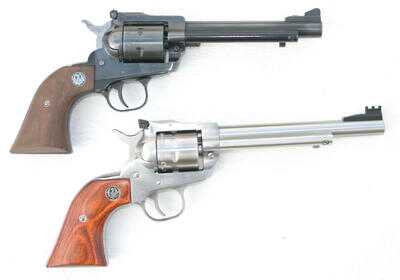
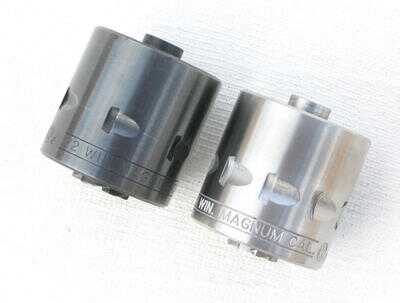
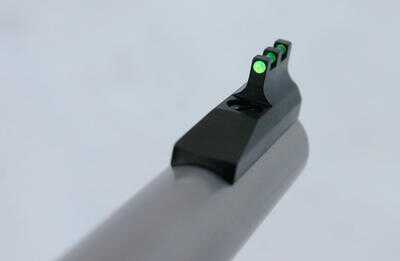
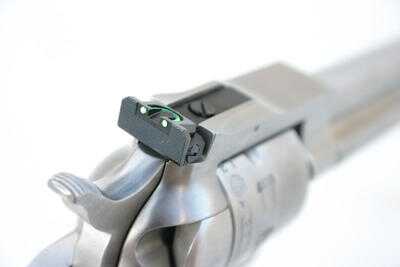
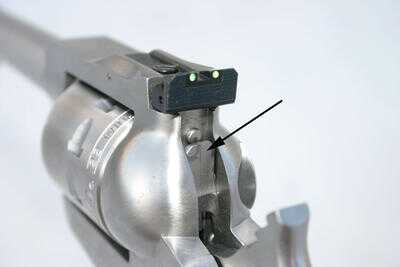
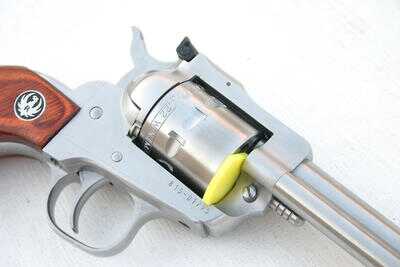
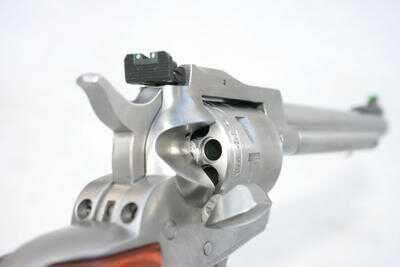
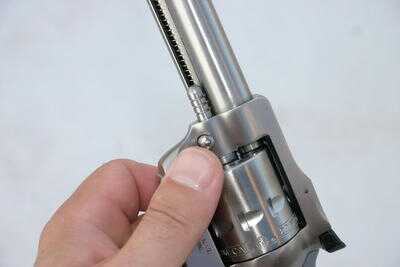
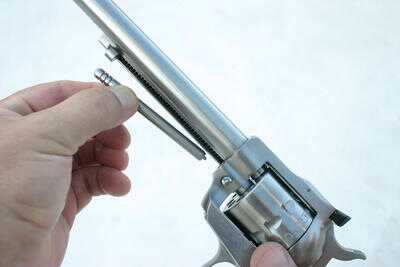
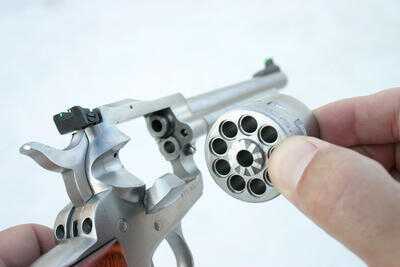
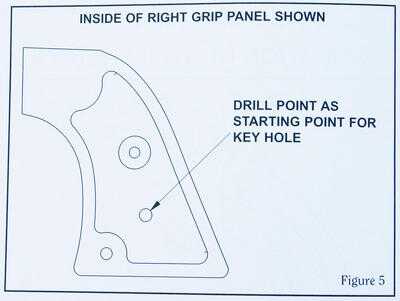
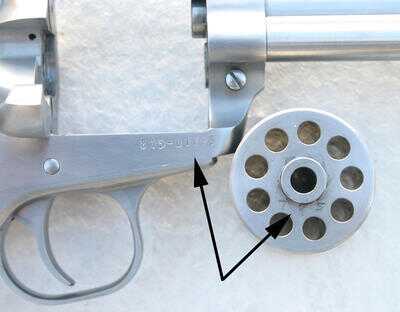
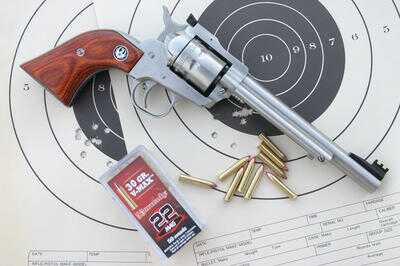
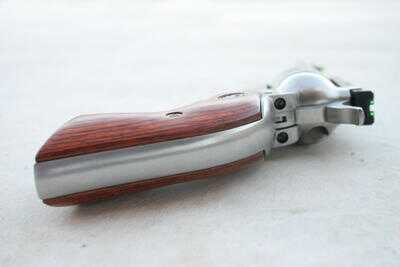
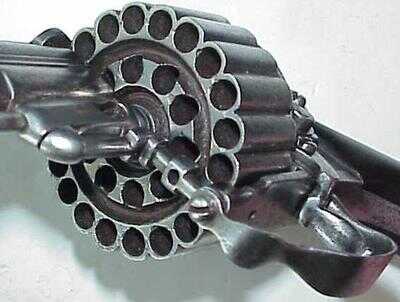
I noticed every inch of barrel for a 22 magnum from 5 to 12 inches that the velocity increases dramatically and was wondering if RUGER will ever manufacture a 9.5 inch or 12 inch barrel for its new model nine? If not, I hope I can get my hands on a 9.5 ” Ruger New Model Six. I’ve been a ballistics nut with the 22 WMR since around 1969 and it seems Ruger has the edge on great barrels, especially better than other cheaper long barreled revolvers
How did the revolver jam
When the Single Ten came out, I was ready to spend money I was saving for a more expensive revolver. But, I ended up buying the more expensive model six months later. My only beef with Ruger? They won’t make a blued model. Never had a problem with blued steel, to start wasting money on stainless steel. It is the simplest thing in the world to do; Take Care Of Your Firearms. That’s my take on Stainless Steel.
Just wondering if the Ruger single 9 is legal in California?
Thanks
Your article is thorough and useful. Thanks. My “made in the 200th year of American liberty” (1976) convertible was stolen recently, and it was the one gun I had wanted to keep as a family heirloom. So well made, balanced, great trigger, and highly accurate with .22WMR. A classic. Having read your observations, believe I’ll purchase a nine rather than another convertible. I’ve always liked the .22WMR and pretty much ceased using the .22 cylinder. My only suggestion is that testing the nine at 10 yards is not a valid test. You should have waited to test-fire the accuracy of a .22WMR pistol at 25 yards, at least.
Is there a green or red laser (attachable) that can be at purchased to put on my Ruger Single Six 22 Convertible pistol?
Is it possible to load and shoot 22 lr. rounds in the 22 mag. Cylinder.
Can you use the new 9 capacity cylinder cambered in 22 mag in an older Ruger 1975 single six 22?
…’by making two separate guns, Ruger can better satisfy overall consumer demand for guns.”
Is that doublespeak for, “By not offering a convertible, we can sell two guns instead of one.” ?
(I purchased a stainless convertible in “the 200 year of American Liberty” so-stamped on the barrel … and it’s among my favorite possessions — accurate, smooth, shooting either the economical .22 or the zippy mag.)
I would love to have ruger to come out with a 22 mag semi auto pistol….I also love revolvers too.. I have the single six and plan on getting the single nine great guns…
I’ve have owned a Ruger Single 6 Convertible for about 10 years; without a doubt, it is easier to shoot than my Ruger Super Red Hawk .454 Casull/.45 Colt. The Ruger Single 6 is a sweet shooter while the .454 Casull has caused a lot of bleeding from my thumbs. At the same time, 1911 A-1’s in .45 acp are unusually super pistols – I have a stainless GI Springfield 1911 A-1 and it handles better than a Colt 1911 A-1 I shot in Southeast Asia in 1969 and ’70. By the way, can anyone believe ammunition has disappered from practically all sporting good stores? What is the use of having guns if you can’t buy ammo? Since I have hunted and shot guns for over a half century, I have never seen anything like this! I realized while overseas that we have visitors (aliens, dimentional creatires, whatever?) in the skies and not all of them are friendly to humans and the U.S. Government. Because top government officials are scared to death of these “things,” how can they possibly tell the civilian population that we are not alone and some of us are being abducted by bizarre creatures. This fact alone made me collector of all types of weapons. My AK 47 is awesome but UGLY. I worked on Nuclear Alert Pads where I assisted in loading bombs and missles (Using long metal poles). Everyone on these sites knew we were not alone. I became a UFO investigator in MUFON and wish now I had written my book on UFOs 40 years ago (DIVINE CURSES – AMAZON ebooks). I am currenting looking for a Ruger Super Black Hawk in .44 magnum – something easier on the hands than a .454. Ruger is impossible to beat as a handgun, and I love the 10/22’s too.
I have the single nine and it is by far the most accurate pistol I have ever shot
Just purchased a Ruger single nine. Love the balance. Will it be possible in the future to buy a .22 LR cylinder to fit? Help with the expense of shooting.
Phil, I wouldn’t rule it out “one of these days.”
Some questions would appreciate the help. I bought a Ruger 22 LCR and like it for all the reasons in the comments above, When I got it in the box there was a lock with it, like a padlock with a long extended loop. I assumed it would go through the cylinder but the loop bar is too big to fit into the cylinder. I am puzzled as to how to use this lock as I can’t see any place to attach it except to put it around the handle of my gun storage box. What am I missing and please, don’t bother making fun of my question. I am 65, a decent shot, work in a large downtown city and just want to get better at all my gun handling. Thanks
Kathie, open the cylinder, and put the padlock on the top strap of the cylinder frame. Locked as such, you can’t close the cylinder, so the gun can’t be fired.
Some questions would appreciate the help. I bought a Ruger 22 LCR and like it for all the reasons in the comments above, When I got it in the box there was a lock with it, like a padlock with a long extended loop. I assumed it would go through the cylinder but the loop bar is too big to fit into the cylinder. I am puzzled as to how to use this lock as I can’t see any place to attach it except to put it around the handle of my gun storage box. What am I missing and please, don’t bother making fun of my question. I am 65, a decent shot, work in a large downtown city and just want to get better at all my gun handling. Thank you,
Nice gun, but I’ll stick with my S&Ws. If I could find a 9 shot convertible I’d buy one. Can’t so I won’t.
nice
I believe that the BS about producing less guns per day by adding an interchangeable cylinder is a crock.
I will not buy this gun until it is produced with interchangeable cylinders.
I want to be able to switch, at my convenience, from 22LR to 22WMR.$$$$$$$$
Convertible is the only way to ride!!!! And Sturm Ruger will not dictate, at least to me, otherwise.
I didn’t hear any “dictating”……… maybe you should talk to someone about these things you’re hearing….
The talk of the revolver being “dead” for defense comes from people who have never mastered one. I shoot a .357 regularly (model 27 S&W) and with friends who do the same. I can tell you that in the right hands, I would never want to face a skilled shooter with a revolver more than a dozen spray and pray guys. Also, I always recommend a first time shooter start with a good revolver and master it before going on to autos. Don’t get me wrong, I own many autos, love my sigs, have a life long love affair with the Browning HP (my first auto) but revolvers are still great weapons. BTW, now in my mid sixties, I plan to purchase soon a S&W .357 revolver in the eight shot version from their performance center. I expect it will become my final home defense hand gun, along with a 12 gauge shot gun. It will require little upkeep, no concern about springs etc as stored and simplicity of operation the even an old 80 year old can handle.
i have a S&W 627 pc like you speak of it is my home defense gun and you won’t be disappointed and a benelli super nova tactical w/rifle sights to complete my home defense. I love revolvers and ruger makes a good one.
Can the new Single 9 WRM be fitted with the trapper style front sight; rather than the large glow or big blade that I see it with. Either of thes front sights will keep me from purchasing the gun. which I like very much.
Thank you
Stephen LeRoy
It is removable so the single six sights should fit.
I keep my spare cylinder for my convertible Single Six in an old handcuff case. Fits on the gunbelt and handy when I want it.
Great guns as always..from ruger. If I bought this model the first thing I’d do is change out those stupid looking fiber optic sights, those sights kill the asthetics of that revolver..
I love revolvers. Especially being female and not a super gun-nut. Revolvers are easier to understand, use, clean and repair. I have been thoroughly unimpressed with all the ‘clip guns’ (as I call them) that I’ve ever handled. Always jamming. I’ll take the revolver any day!
Banatu- They’re called magazines, not ‘clips’. Clips and magazines are 2 completely things, serving 2 different purposes.
Jamming of ammo, failure to feed [FTF] and failure to eject [FTE] in quality pistols, using appropriate ammo, is normally a function of a bad magazine, a dirty weapon, an incorrect recoil-spring for that particular ammo velocity or, like Wolf Match Target, a function of a sticky-lube attached to the ammo when purchased new, that doesn’t allow for quick chambering and extraction of fast moving parts like the ones found on semi-auto .22 pistols and rifles.
With millions of .22 Semi-auto pistols in use like the Ruger Mark III, SR22, Browning 1911-22, and more semi auto rifles than you can shake a bunny’s tail at, semi-autos chambered in .22 [Short, Long, LR, WMR] have eclipsed the problem of FTF & FTE have been resolved…. years ago.
But we carry with what we feel most confident. Cheers.
Banatu,
The most common reason for jamming, which is rarely addressed, is a poor grip technique. Failure to grip the firearm properly and maintain control through the movement of the action does not allow the slide to cycle properly and results in jamming. I see it all the time.